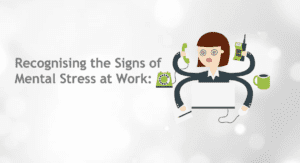Recognising the Signs of Mental Stress at Work
In today’s fast-paced and demanding work environments, it’s not uncommon for employees to experience mental stress. While a certain amount of stress can be motivating, excessive and prolonged stress can have detrimental effects on one’s well-being and productivity.
Changes in Behaviour
One of the earliest indicators of mental stress is changes in behaviour. Keep an eye out for significant shifts in how a colleague typically behaves. This may include increased irritability, mood swings, or withdrawal from social interactions. Conversely, someone who is usually quiet may become more talkative when stressed as a way to cope.
Physical Symptoms
Stress doesn’t just affect the mind; it can manifest physically too. Look for physical symptoms such as headaches, muscle tension, fatigue, digestive issues, or changes in appetite. Frequent complaints of these issues may indicate underlying stress.
Decline in Performance
A noticeable decline in work performance can be a red flag. This might include missed deadlines, increased errors, or a sudden drop in productivity. Stress can impair one’s ability to concentrate and make sound decisions.
Increased Absenteeism
Excessive absenteeism or a sudden increase in taking sick days can be a sign that an employee is struggling with mental stress. They may need time to recover emotionally and mentally.
Emotional Changes
Keep an eye out for emotional changes such as increased anxiety, fear, or even panic attacks. Some individuals may become more emotional, while others may appear emotionally numb. If someone frequently appears overwhelmed, it’s crucial to take notice.
Social Withdrawal
Stressed individuals may withdraw from social activities, including team lunches, meetings, or work-related events. Isolation can be a way to cope with stress, as the individual may feel overwhelmed by social interactions.
Neglect of Self-Care
Someone under mental stress may neglect self-care routines they once prioritised. This can include skipping meals, not getting enough sleep, or neglecting exercise. The deterioration of self-care habits can further exacerbate stress.
Increased Use of Substances
Some individuals may turn to substances like alcohol or caffeine as a way to cope with stress. Increased consumption of these substances can be a sign of underlying stress issues.
Complaints of Unmanageable Workload
An employee expressing that their workload is unmanageable or consistently overwhelming may be experiencing stress. They might feel unable to keep up with their responsibilities.
Frequent Health Complaints
Stressed individuals may frequently complain of vague health issues like stomach-aches, backaches, or frequent illnesses. These can be physical manifestations of emotional stress.
Conclusion
Recognising the signs of mental stress at work is the first step in helping colleagues or employees who may be struggling. Creating a supportive work environment that encourages open communication about mental health is crucial. Encourage employees to seek assistance if they are experiencing stress and consider implementing stress management programs and resources within the workplace.
By taking proactive steps to address mental stress, organisations can promote the well-being and productivity of their employees, ultimately benefiting both individuals and the company as a whole.


